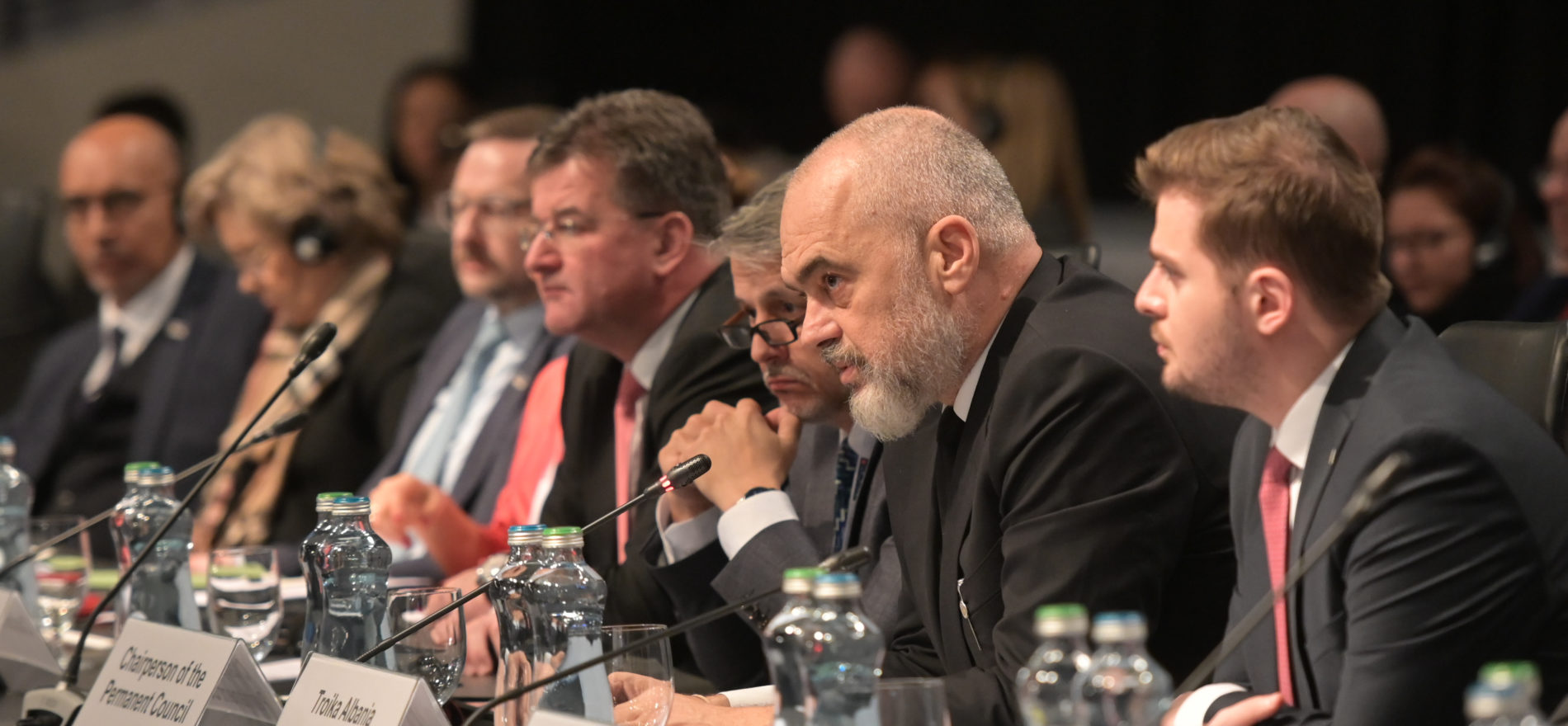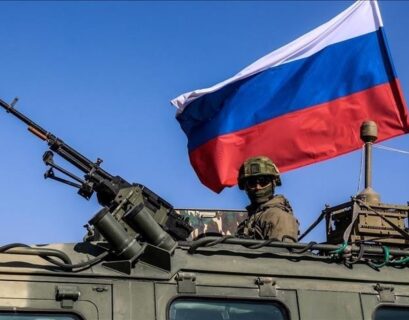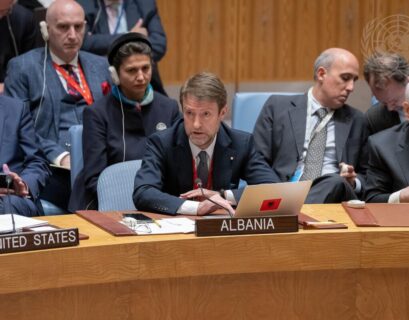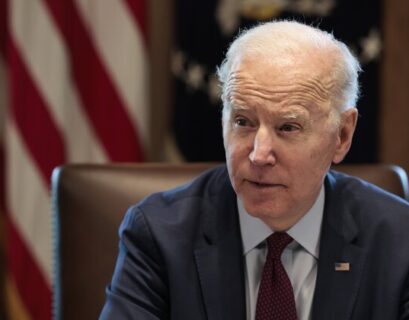VETON SURROI
On the first day of the upcoming year, Albania will assume the Chairmanship of the Organization for Security and Cooperation in Europe (OSCE). At the hand-over ceremony of the Chairmanship from Slovakia, one can imagine the former Chair informing his Albanian counterparts about OSCE peacekeeping missions in Ukraine, Georgia, Transdniestrian region in Moldova or Nagorno Karabagh. They will also inform them on the mission to Kosovo (or ‘Kosovo and Metohija’ when speaking to delegations from Serbia, Russia or others in its obrite). They may also inform Albania’s delegation on another OSCE mission which did not belong to the former Soviet Union or Yugoslavia – a country known as Albania.
Said differently, Albania will assume the upcoming Chairmanship of the OSCE and be informed from the previous chair on the organizations work in Albania. This is a seemingly absurd scene. But if it can serve as comforting to Albania and Albanians, this is not the first time this scene has played out. Previously, Bosnia and Herzegovina were elected a non-permanent member of the UN Security Council as the body was preparing an assessment report on the country itself. This is however not comforting. Bosnia and Herzegovina is not a proper state.
Assuming the Chairmanship of the OSCE is a great honor for Albania. The decision to support its candidacy is in part due to its positive role during the tragic wars leading to the dissolution of Yugoslavia for which it is highly regarded by many member states. When the 2020 Chairmanship of the organization was decided, the dominant perception was that Albania had become at last a stable country, adhered to NATO and aspired EU membership as it gradually transforms itself into a functional democracy which guarantees its citizens perspective. Given this consideration, the chairmanship was expected to further advance Albania’s international position as part of the club of states with credibility.
But Albania, which will temporarily lead the organization starting on January 1st, is unlikely to provide an added value, guidance to the mission in Ukraine’s Luhansk, answers to Russia’s persistence not to reduce its armament in Transdniestria, or add something to repeated pleas for reconciliation through the mission in Nagorno Karabagh. Russian diplomats must have already briefed its ‘frozen conflict’ clients about the upcoming round of foreign diplomats with an OSCE mission in their own country to explain that peace is a better alternative to war. The mission, in softer terms referred to as ‘the presence’ ritually deals with the recycling of democratic power legitimacy, otherwise known as elections.
OSCE has similar missions in Serbia and North Macedonia whereas the former is increasingly autocratic and the latter more democratic. In comparison, the country assuming the chairmanship of the organization is caught in a serious institutional crisis that stands out even among the region’s outrageous precedents as uniquely authentic. As such, Albania embarks on the new year with imbalanced institutional powers, notable among which is the absence of a functioning Constitutional Court over the last two years. The legislative is also without an opposition. As a result, its prime minister governs untroubled from pressure from institutional or political checks and balances which free him from consideration for critical voices. In absence of a power balance between the three branches of the government, the President has turned into an oppositional force. The political opposition itself has become a mere spectator.
I fear that the project image of Albania prior to assuming the leadership of the OSCE does not exist anymore. Prime Minister Rama may be the only figure with the deserving stature in his government worth considering for the role, but even he will not be able to as he will be increasingly preoccupied with internal political issues. It will be hard to preconceive that whatever peacekeeping mission priorities there may be for the organization, Mr. Rama will be able to allocate even a moment of his focus away from the byzantine mechanisms he is employing to install loyalists in the justice ‘reform.’ If he does not pursue this course, his opponents will; if he does not hijack the reform, others will. On top of this gloom are the ramifications of the November 26th earthquake, with which the government will be preoccupied in the first half of 2020.
When Albania was elected to lead the organization in 2020, many of its well-wishers, be them at home or abroad, were jubilant. This could have provided a great opportunity for a new generation of diplomats who could have represented the country in an emotionally affecting manner; since the state apparatus in these occasions improves its performance beyond previously known standards. It is often in occasions such as this both the society and the state dug out energies, they did not know they had at their disposal. But this is unlikely to happen in the case of Albania, which is expected to be marred by democratic legitimacy crisis until it reaches a tipping point.
This could turn into an absurd historical development where the country leading the OSCE could need its assistance to hold general and local elections and to regain the democratic legitimacy of the legislative and the executive.
If the chairmanship of the OSCE was previously considered as a quick medical treatment to prevent conflict escalation and assist in overcoming issues associated with democratic transition, Albania is likely to find itself in the midst of a paradox as it will seek to simultaneously seek and provide these services to others.
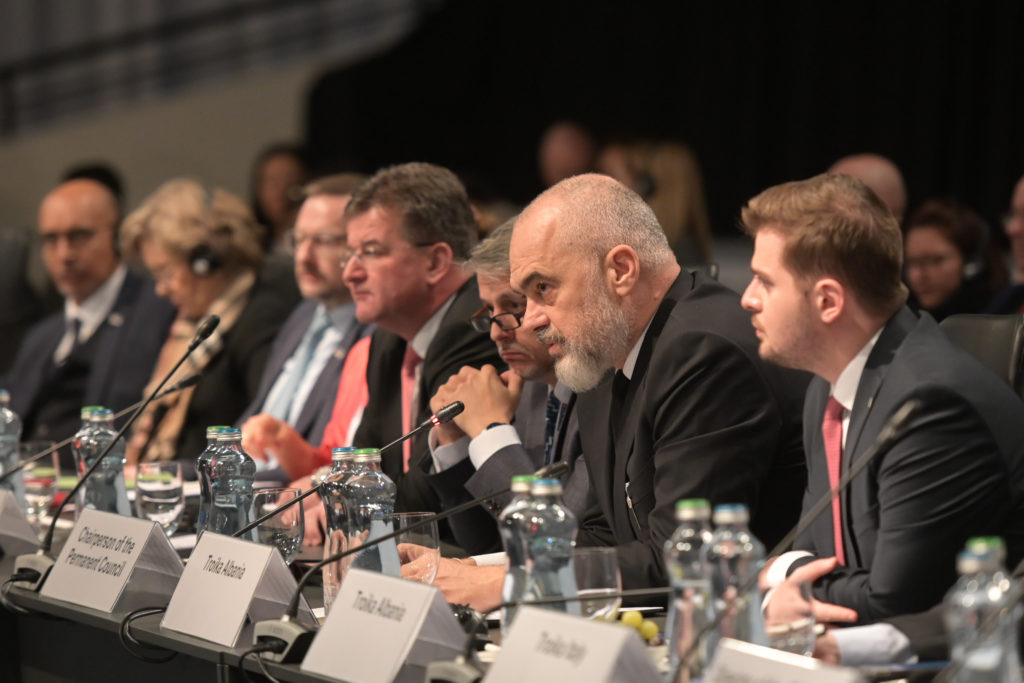
Edi Rama, Prime Minister of Albania during the opening session of the 26th OSCE Ministerial Council, Bratislava, 5 December 2019.
Copyright: All rights reserved to OSCE/441751


